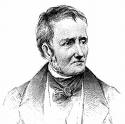
DE QUINCEY, THOMAS (1785-1859). —Essayist and miscellaneous writer, son of a merchant in Manchester, was born there. The aristocratic "De" was assumed by himself, his father, whom he lost while he was still a child, having been known by the name of Quincey, and he claimed descent from a Norman family. His Autobiographic Sketches give a vivid picture of his early years at the family residence of Greenheys, and show him as a highly imaginative and over-sensitive child, suffering hard things at the hands of a tyrannical elder brother. He was educated first at home, then at Bath Grammar School, next at a private school at Winkfield, Wilts, and in 1801 he was sent to the Manchester Grammar School, from which he ran away, and for some time rambled in Wales on a small allowance made to him by his mother. Tiring of this, he went to London in the end of 1802, where he led the strange Bohemian life related in The Confessions. His friends, thinking it high time to interfere, sent him in 1803 to Oxford, which did not, however, preclude occasional brief interludes in London, on one of which he made his first acquaintance with opium, which was to play so prominent and disastrous a part in his future life. In 1807 he became acquainted with Coleridge, Wordsworth, and Southey, and soon afterwards with C. Lamb. During the years 1807-1809 he paid various visits to the Lakes, and in the latter year he settled at Townend, Grasmere, where Wordsworth had previously lived. Here he pursued his studies, becoming gradually more and more enslaved by opium, until in 1813 he was taking from 8,000 to 12,000 drops daily. John Wilson (Christopher North), who was then living at Elleray, had become his friend, and brought him to Edinburgh occasionally, which ended in his passing the latter part of his life in that city. His marriage to Margaret Simpson, daughter of a farmer, took place in 1816. Up to this time he had written nothing, but had been steeping his mind in German metaphysics, and out-of-the-way learning of various kinds; but in 1819 he sketched out Prolegomena of all future Systems of Political Economy, which, however, was never finished. In the same year he acted as editor of the Westmoreland Gazette.
His true literary career began in 1821 with the publication in the London Magazine of The Confessions of an English Opium-Eater. Thereafter he produced a long series of articles, some of them almost on the scale of books, in Blackwood's and Tait's magazines, the Edinburgh Literary Gazette, and Hogg's Instructor, These included Murder considered as one of the Fine Arts (1827), and in his later and more important period, Suspiria De Profundis (1845), The Spanish Military Nun (1847), The English Mail-Coach, and Vision of Sudden Death (1849). In 1853 he began a collected edition of his works, which was the main occupation of his later years. He had in 1830 brought his family to Edinburgh, which, except for two years, 1841-43, when he lived in Glasgow, was his home till his death in 1859, and in 1837, on his wife's death, he placed them in the neighbouring village of Lasswade, while he lived in solitude, moving about from one dingy lodging to another.
De Quincey stands among the great masters of style in the language. In his greatest passages, as in the Vision of Sudden Death and the Dream Fugue, the cadence of his elaborately piled-up sentences falls like cathedral music, or gives an abiding expression to the fleeting pictures of his most gorgeous dreams. His character unfortunately bore no correspondence to his intellectual endowments. His moral system had in fact been shattered by indulgence in opium. His appearance and manners have been thus described: "A short and fragile, but well-proportioned frame; a shapely and compact head; a face beaming with intellectual light, with rare, almost feminine beauty of feature and complexion; a fascinating courtesy of manner, and a fullness, swiftness, and elegance of silvery speech." His own works give very detailed information regarding himself. See also Page's Thomas De Quincey: his Life and Writings (1879), Prof. Masson's De Quincey (English Men of Letters). Collected Writings (14 vols. 1889-90).
*******
See also: "De Quincey," by Leslie Stephens.
Disclosure: We are independently owned and the opinions expressed here are our own. We do have advertisements with links to other sites on our pages, and may receive compensation when you click on one of those links and/or purchase something from one of those sites.
Copyright © D. J. McAdam· All Rights Reserved